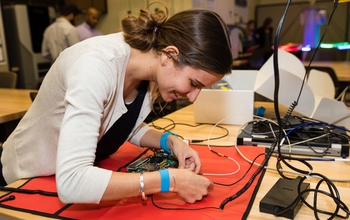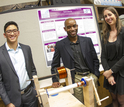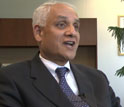News Release 15-066
NSF awards $12 million to spur an engineering education revolution
Six departments receive funding to redesign undergraduate engineering and computer science education

The RED projects will build on successful innovations in the introductory and capstone years.
June 15, 2015
This material is available primarily for archival purposes. Telephone numbers or other contact information may be out of date; please see current contact information at media contacts.
Updated July 13, 2016 to include 2016 awards
To solve 21st century technological challenges, society will rely upon today's undergraduate engineering and computer science programs and their ability to prepare diverse communities of students with professional skills.
The National Science Foundation (NSF) Directorates for Engineering, Computer and Information Science and Engineering, and Education and Human Resources have jointly awarded $12 million to engineering and computer science departments to enact groundbreaking, scalable and sustainable changes in undergraduate education.
The engineering and computer science professions have a large potential to address national priorities and societal grand challenges," said Pramod Khargonekar, NSF assistant director for engineering. "To flourish in the future, engineering and computer science must attract and retain people from all sectors of society."
These five-year, $2 million awards are part of NSF's multiyear effort to help universities substantially improve the professional formation of engineers and computer scientists--the formal and informal processes and value systems by which people become experts in these fields. A key component is support for revolutionizing engineering departments, an NSF activity known as RED.
"An underlying premise of RED is that department heads can be critical levers for change," said Donna Riley, NSF program director for engineering education research. "RED focuses on transforming department structure and faculty reward systems to stimulate comprehensive change in policies, practices and curricula."
The RED projects will build upon successful innovations in the introductory and capstone years to improve the entire undergraduate experience, including technical core courses during sophomore and junior years, extracurricular professional activities and student transfer from two- to four-year institutions. The awards also may support faculty development, faculty incentives and inclusive academic cultures.
The RED investment aligns with the NSF-wide undergraduate STEM education initiative, Improving Undergraduate STEM Education (IUSE).
NSF made six RED awards in fiscal year 2015:
- Anil Bajaj and co-investigators Edward Berger, Elizabeth Briody and Edward Morrison will focus on the Purdue University mechanical engineering department with the project "An Engineering Education Skunkworks to Spark Departmental Revolution."
- Anthony Maciejewski and co-investigators Zinta Byrne, Thomas Chen and Michael De Miranda will focus on the Colorado State University department of electrical and computer engineering with the project "Revolutionizing Roles to Reimagine Integrated Systems of Engineering Formation."
- Mary Lou Maher and co-investigators Bojan Cukic, Celine Latulipe, Jamie Payton and Steven Rogelberg will focus on the University of North Carolina at Charlotte computer science department with the project "The Connected Learner: Design Patterns for Transforming Computing and Informatics Education."
- Ann McKenna and co-investigators Samantha Brunhaver, Shawn Jordan, Nadia Kellam and Micah Lande will focus on the Arizona State University Polytechnic School's department of engineering and manufacturing engineering with the project "Additive Innovation: An Educational Ecosystem of Making and Risk Taking."
- Chell Roberts and co-investigators Michelle Camacho Ming Huang, Susan Lord and Rick Olson will engage the University of San Diego school of engineering including departments of electrical, industrial and systems, and mechanical engineering in the project "Developing Changemaking Engineers."
- James Sweeney and co-investigators Michelle Bothwell, Milo Koretsky, Devlin Montfort and Susan Nolen will focus on the Oregon State University department of chemical, biomedical and environmental engineering with the project "Shifting Departmental Culture to Re-Situate Learning and Instruction."
In fiscal year 2016, NSF made seven additional RED awards totaling $14 million:
- Timothy Andersen and co-investigators Amit Jain, Noah Salzman, Donald Winiecki and Dianxiang Xu will focus on the Boise State University computer science department with the project "Computer Science Professionals Hatchery."
- Rashid Bashir and co-investigators Jennifer Amos, Stephen Boppart, Geoffrey Herman and Jeffrey Loewenstein will focus on the University of Illinois at Urbana-Champaign bioengineering department with the project "Defining the Frontiers of Bioengineering Education at Illinois and Beyond."
- Abhaya Datye and co-investigators Eva Chi, Sang Han, Sung Kang and Vanessa Svihla will focus on the University of New Mexico department of chemical and biological engineering with the project "Formation of Accomplished Chemical Engineers for Transforming Society."
- Ann Gates and co-investigators Martine Ceberio, Christina Convertino, Salamah Salamah and Natalia Villanueva Rosales will focus on the University of Texas at El Paso computer science department with the project "A Model of Change for Preparing a New Generation for Professional Practice in Computer Science."
- David Jiles and co-investigators Sarah Rajala, Diane Rover, Mack Shelley and Joseph Zambreno will focus on the Iowa State University department of electrical and computer engineering with the project "Reinventing the Instructional and Departmental Enterprise to Advance the Professional Formation of Electrical and Computer Engineers."
- Luke Lester and co-investigators Benjamin Knapp, Thomas Martin, Lisa McNair and Matthew Wisnioski will focus on the Virginia Tech electrical and computer engineering department with the project "Radically Re-designing the Fan-in and Fan-out of an Electrical and Computer Engineering Department."
- Beena Sukumaran and co-investigators Theresa Bruckerhoff, Stephanie Farrell and Harriet Hartman will focus on the Rowan University civil and environmental engineering department with the project "Rethinking Engineering Diversity, Transforming Engineering Diversity."
The teams will share ideas, learn from the first group of awardees, and begin to be part of the RED community at an NSF meeting for RED principal investigators July 12-13, 2016.
NSF plans to call for proposals for RED again in FY 2017.
-NSF-
-
These awards are part of a multiyear effort to improve the professional formation of engineers.
Credit and Larger Version -
View Video
Pramod Khargonekar of NSF describes engineering education challenges.
Credit and Larger Version -
View Video
Pramod Khargonekar of NSF explains why departments have an opportunity to transform engineering.
Credit and Larger Version
Media Contacts
Sarah Bates, NSF, (703) 292-7738, email: sabates@nsf.gov
Program Contacts
Donna M. Riley, NSF, (703) 292-7107, email: driley@nsf.gov
Related Websites
Revolutionizing Engineering Departments FY 2015 solicitation: http://www.nsf.gov/pubs/2014/nsf14602/nsf14602.htm
The U.S. National Science Foundation propels the nation forward by advancing fundamental research in all fields of science and engineering. NSF supports research and people by providing facilities, instruments and funding to support their ingenuity and sustain the U.S. as a global leader in research and innovation. With a fiscal year 2023 budget of $9.5 billion, NSF funds reach all 50 states through grants to nearly 2,000 colleges, universities and institutions. Each year, NSF receives more than 40,000 competitive proposals and makes about 11,000 new awards. Those awards include support for cooperative research with industry, Arctic and Antarctic research and operations, and U.S. participation in international scientific efforts.
Connect with us online
NSF website: nsf.gov
NSF News: nsf.gov/news
For News Media: nsf.gov/news/newsroom
Statistics: nsf.gov/statistics/
Awards database: nsf.gov/awardsearch/
Follow us on social
Twitter: twitter.com/NSF
Facebook: facebook.com/US.NSF
Instagram: instagram.com/nsfgov





